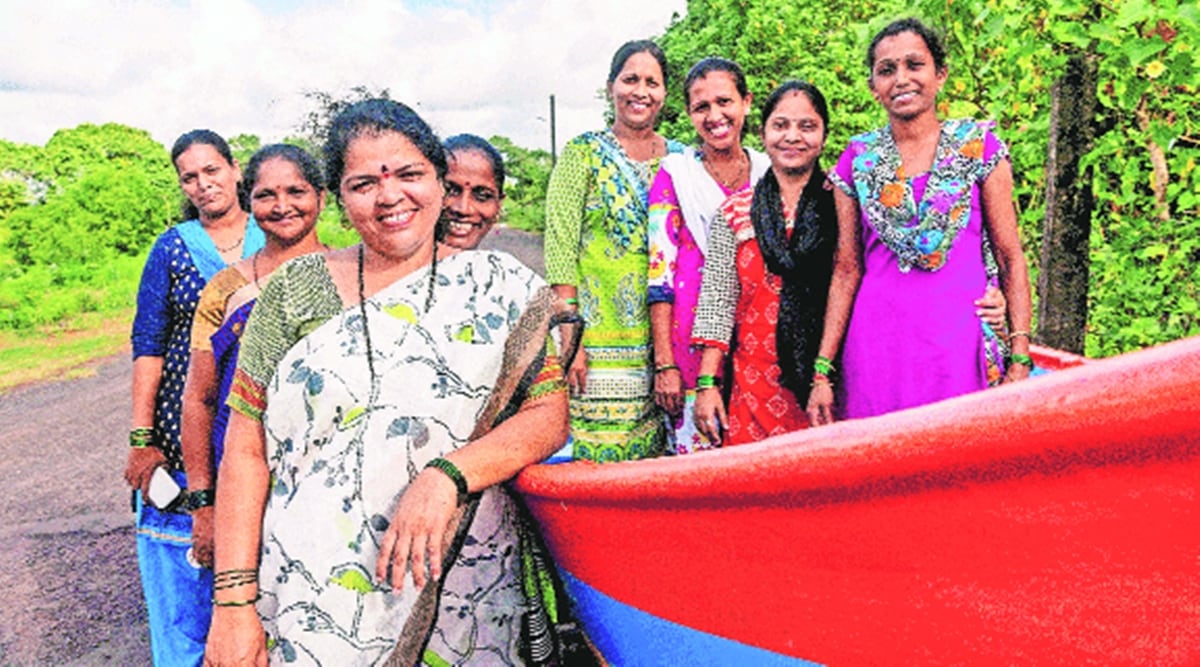 The all-women crew in the coastal Vengurla town in Sindhudurg district. (Express photo)
The all-women crew in the coastal Vengurla town in Sindhudurg district. (Express photo)A pioneering project by the women of Swamini Self Help Group (SHG) in the coastal Vengurla town in Sindhudurg district has become a role model for the Green Climate Fund (GCF) project to be implemented by the United Nations Development Programme (UNDP) across the state’s 720-km-long coastline and in two other states — Andhra Pradesh and Odisha.
“We belong to the fishing community and always thought about making use of nature’s beauty for our livelihood but had no direction. A UNDP team got in touch with us in 2014 and told us not to focus on traditional tourism practices but doing so in an eco-friendly manner under which we will give a guided tour to tourists, explaining mangroves and its importance,” said Shweta Hule of Swamini SHG.
With the UNDP’s help, a project report was submitted for which an approval to the project cost of Rs 5.96 lakh was received from the state’s Mangrove Cell in 2016. The women purchased two manual rowing boats with 12 persons to push the wooden oars and a Gazebo.
“The cell organised multiple training programmes where information about mangroves and other aspects, including its diversity and how to identify types of mangroves, its importance to the ecosystem, scientific names and what mangroves do, for the women. A special English-speaking course was also arranged and so was a hospitality management course,” N Vasudevan, IFS (retired), who headed the state’s Mangrove Cell, said.
Subscriber Only Stories
The project started on January 26, 2017. Since then, thousands of tourists have been on these trips to the mangroves in Vengurla creek. The all-women crew gives them information on mangroves and its importance to the coastal ecosystem, scientific names of different species and the need to conserve mangroves to mitigate harsh natural calamities. The group also runs a small, made-to-order food restaurant for tourists.
“The entire process has helped our families financially and we now travel to different coastal villages, informing women about our work and encouraging them about initiating similar activities in those areas,” Hule said.
“Under the Green Climate Fund, the mandate is to come up with sustainable livelihood opportunities for communities. We are trying to scale up and set up more groups like Swamini. This model of joint venture of the UNDP, Maharashtra government and a group of women will be replicated in different parts of the state,” said Rohit Sawant, who has been working with the Swamini group and on similar projects related to coastal ecosystems.
Ashish Chaturvedi, head, Energy, Environment and Resilience, UNDP said the Green Climate Fund project supports and works with the Indian government to enhance the resilience of vulnerable coastal communities. “We are suggesting a need for a paradigm shift of coastal governance toward a new approach by integrating ecosystem-based approaches to adaptation into coastal management and planning. This project is also active in two other states — Odisha and Andhra Pradesh,” he said.
In Maharashtra, around 160 hectares of mangrove restoration was completed by June this year and mangrove nurseries have been established in project districts. In addition, channel digging and mangrove plantation has been initiated on 78 hectares.
Efforts in this direction are being undertaken in partnership with scientific institutions such as the National Institute of Oceanography (NIO) to develop a baseline study for assessing biodiversity and bio-physical status of coral reef ecosystems along the Maharashtra coastline which will boost prospects of reef restoration.
“Overall, the impact that we want to achieve out of this project is that 10 million people across 12 districts in three states benefit from the increased resilience of the coastal ecosystem..,” Chaturvedi said.
- The Indian Express website has been rated GREEN for its credibility and trustworthiness by Newsguard, a global service that rates news sources for their journalistic standards.

